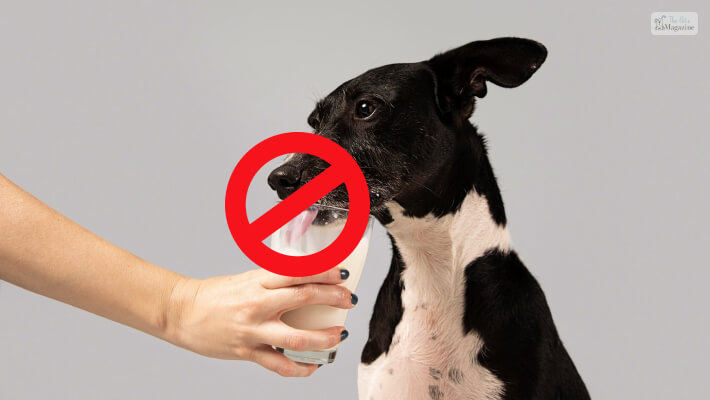Can Dogs Have Almond Milk? | Is Almond Milk Okay for Dogs?


Animals often have weird eating habits. I have seen goats eat fish (and I am not kidding). But feeding your dogs almond milk doesn’t come under their eating habits. It is what you choose to feed your dog.
But, before giving your dog a specific food daily, you have to check if these foods are good for them. For example, many pet parents ask if dogs can have almond milk. Well, can they?
If you are wondering if you should give almond milk to your dogs, then this article should help you. This article will help you understand whether or not you should give almond milk to your dog.
Can Dogs Have Almond Milk?

Yes, you can give almond milk to your dog. But it does not have the necessary nutrient that your dog needs daily. As a necessary nutrient, almond milk does not help dogs through their daily eating habits.
Yes, they are easily available in grocery stores. You can store as much as you can in your refrigerator. However, they are not good enough if you consider them on your dog’s daily diet. Almond milk is derived by processing almonds. They are safe for pets like dogs and cats if you serve these in moderation.
The same goes for soy milk. Soy is among the top food allergens in dogs. So if your dog has a food allergy, you should avoid giving them soy milk.
What Happens If A Dog Drinks Almond Milk?
Almonds are high in fat and are difficult for the stomach of the dogs to digest. Having almond milk may cause the dog to have gastrointestinal signs like oily or watery diarrhea.
What Kind Of Milk Is Safe For Dogs?
If not almond milk then which milk? – Now this question is popping inside your mind. Dogs are usually not the animals to love to have milk. However, if you want to feed milk then you should choose cow milk or you can go for goat milk. But you should make sure to serve it to them in minimum quantities.
Are Almonds Poisonous To Dogs?
Yes, almond milk is not the best nutrition your dogs can have. But does that mean they are poisonous? No, almonds are not poisonous food for dogs. However, they are also not so stomach-friendly food for the canines. They are bad for the digestive systems of dogs.
Why Should You Avoid Giving Your Dog Almond Milk Or Soy Milk?

There are some good reasons why you should avoid giving your dog and cats almond milk. Your pet first needs a well-balanced, healthy diet that covers all the nutrients. But the calories outside them do not add to their nutrition requirements.
So, can dogs have almond milk regularly? No. Here are a few reasons why –
Reason 1
For example, a cat of 10 pounds needs 200 calories every day. A cup of almond milk contains 100 calories. But you cannot offer adult cats and dogs; these foods work like empty calories for your cat since they don’t contain the nutrients that your cats and dogs require. It will only cause obesity in dogs.
Reason 2
Soy milk and almond milk are also often sweetened. They contain added sugar. Added sugars are not good for your dog. They are not good for your cats as well. Added sugar in the soy milk and almond milk can cause your dog’s tooth to decay. Added sugar is also a reason for obesity. Some almond milk products designed for human consumption may contain additives, flavorings, or sweeteners like xylitol, which can be toxic to dogs. These additives can cause gastrointestinal distress or other health issues.
If a dog ingests almond milk containing xylitol, it can lead to a rapid release of insulin, resulting in a dangerous drop in blood sugar levels (hypoglycemia). Here are some symptoms of xylitol poisoning in dogs:
Vomiting: Dogs that have ingested xylitol may vomit repeatedly.
Weakness and lethargy: Xylitol poisoning can cause dogs to become weak and lethargic. They may appear tired or have difficulty standing or walking.
Loss of coordination: Dogs may experience a loss of coordination and have trouble maintaining their balance. They may stumble, appear disoriented, or have difficulty moving.
Seizures: In severe cases of xylitol poisoning, dogs may experience seizures or convulsions.
Tremors: Dogs may exhibit tremors or shaking movements, particularly in their limbs.
Collapse or unconsciousness: In extreme cases, xylitol poisoning can lead to a dog’s collapse or loss of consciousness.
Thankfully cats don’t care for sweets in milk. You should always avoid artificial sweeteners in cat food and dog foods. Also, xylitol is another toxic element for dogs that you should look for when purchasing dog foods or cat foods.
Reason 3
Almond milk contains high levels of fiber and can be difficult for some dogs to digest. This can lead to gastrointestinal upset, including symptoms such as diarrhea, vomiting, and abdominal discomfort.
Reason 4
Dogs, like humans, can develop allergies to certain foods, including almonds. If your dog is allergic to almonds or has a nut allergy, giving them almond milk can trigger an allergic reaction.
Signs of an allergic reaction may include itching, hives, swelling, difficulty breathing, and even anaphylaxis, which is a severe, life-threatening allergic reaction.
Keep Alert For Symptoms

If you are planning to give your dog almond milk, you should be aware of all the things –
- Vomiting
- Lethargy
- Weakness
- Seizure
If you give your dog almond milk on a regular basis you can expect them to vomit, feel lethargic, and weak. So, can dogs have almond milk? Yes, they can have almond milk, but you should also be ready to see the consequences. Since there is a considerable amount of carbohydrates in almond milk, they are not good for dogs’ digestive systems. It can cause diarrhea.
Can Cats Have Almond Milk?
As I said before, you can serve almond milk to your cat but in a moderate quantity. Since these foods don’t contain the necessary type of nutrients your cat needs they work as empty calories. These foods can cause your cat to have diarrhea or cause obesity.
Can Dogs Have Coconut Milk?
Similar to almond milk, coconut milk is also not that useful when you are choosing a diet for your dog. Organic coconut milk can be incorporated into your dog’s diet. But you need to make sure that you are offering them unsweetened and organic coconut milk. But coconut waters, oils, and milk are not safe for dogs to consume on the regular. It would help if you only offered these to your dog in a limited quantity.
Coconut milk is rich in fat, which can be challenging for some dogs to digest. Excessive consumption of coconut milk can lead to digestive issues, including diarrhea or pancreatitis, especially in dogs with sensitive stomachs or those prone to pancreatitis. Monitor your dog’s response and adjust the amount accordingly.
Since Coconut milk is not toxic or bad for dogs in any other way, it can be given in moderation as an occasional treat rather than a regular part of your dog’s diet. While it can be safe for dogs in small amounts, excessive consumption can lead to digestive upset due to its high fat content.
Can Dogs Have Vanilla?
Giving your dog some amount of coconut milk, soy milk, and almond milk is understandable. But it would help if you did not offer your dog vanilla in any condition. Vanilla is completely damaging to your dog’s health.
Due to its high alcohol content within vanilla, it is harmful to your dog. If your dog drinks even a bottle of vanilla, it could cause serious risks to its health. Smaller-sized dogs are not safe from consuming vanilla.
Can Cats Drink Oat Milk?
Similar to almond and soy milk you can serve your cat with oat milk. It is not necessarily harmful to your cat’s health if served to the animals within a limit. But having oat milk can make your cat’s stomach upset.
But, if you want to serve oat milk to your cat then you should start serving oat milk in a small amount to your cat. They need to get used to the taste of the oat milk. Also, if you see any negative effects of consuming oat milk on your cats, you should stop serving it to them immediately.
Final Words
So, can dogs have almond milk? Obviously, they can. However, they are too high in fat for the stomachs of the dogs. Whenever you serve any food to your dog you should ensure that the food is high in protein and low in fat and carbohydrate. You can offer almond milk to your dog. But you should make sure that you are offering them within a limited quantity.
Did you find this article valuable? You can put your questions below in the comment section. I will be sure to answer them as soon as possible.









Leave A Comment